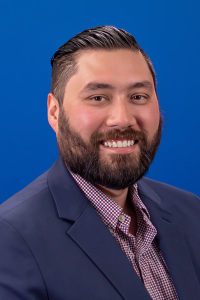
For as long as he can remember, Drew Keane G’24 has been fascinated by history and preservation. That passion eventually led him to pursue a Master of Library and Information Science (MLIS) from Syracuse University’s iSchool—a decision he says was driven by flexibility, reputation, and the program’s emphasis on emerging technologies.
“I’ve always been interested in history and old things, and once I got to undergrad, I saw a future in libraries and archives,” Keane says. “SU’s program stood out because it was fully online, highly rated, and offered concentrations in data science and emerging technologies.”
What surprised him most when he enrolled was how interdisciplinary the curriculum turned out to be. “I expected a strong focus on library science, but I was amazed by the depth of coursework in data administration, digital preservation strategies, and information governance,” he says. “The collaborative nature of the program, with students coming from all kinds of professional backgrounds, really made it dynamic.”
Keane tailored his MLIS coursework to align with academic librarianship and records governance—blending traditional reference and literacy services with modern strategies for managing and preserving digital information. That balance paid off: he recently accepted a new role as University Records Manager at the University of Florida.
“My studies directly supported my career goals,” he says. “I’m especially interested in how academic libraries can enhance their role in digital preservation and research support.”
One of the most challenging aspects of the program for Keane was adapting to the technical side of information science—things like digital preservation systems and programming concepts. “I come from a strong background in policy and records management, so tackling the tech side was an adjustment,” he says. “But engaging with real-world case studies and relying on my coursework and professional network helped me get there.”
He finds excitement in the rapidly evolving nature of the field. “Whether it’s records management, academic libraries, or digital preservation, the way we interact with information is changing fast,” he says. “And we have a chance to shape how knowledge is accessed and preserved for future generations.”
Equally rewarding is the impact of his work. “Helping students and faculty with research, preserving digital records, developing better policies—these are all things that directly affect how information lives on,” he says. “I’ve also developed a stronger voice for advocacy and digital accessibility.”
Throughout his journey, one realization has stuck with him: librarianship is far more than books. “It’s about relationships, accessibility, and ensuring information remains a vital resource for communities,” he says. “Librarians are at the heart of that mission.”
Keane credits the iSchool’s flexibility, community, and faculty with shaping his experience—especially Dr. Megan Oakleaf, whom he calls “an amazing resource throughout the entire program.”
His biggest takeaway? “Flexibility and adaptability are key,” he says. “This field is always evolving, and the willingness to learn and grow is what will keep you at the forefront.”
